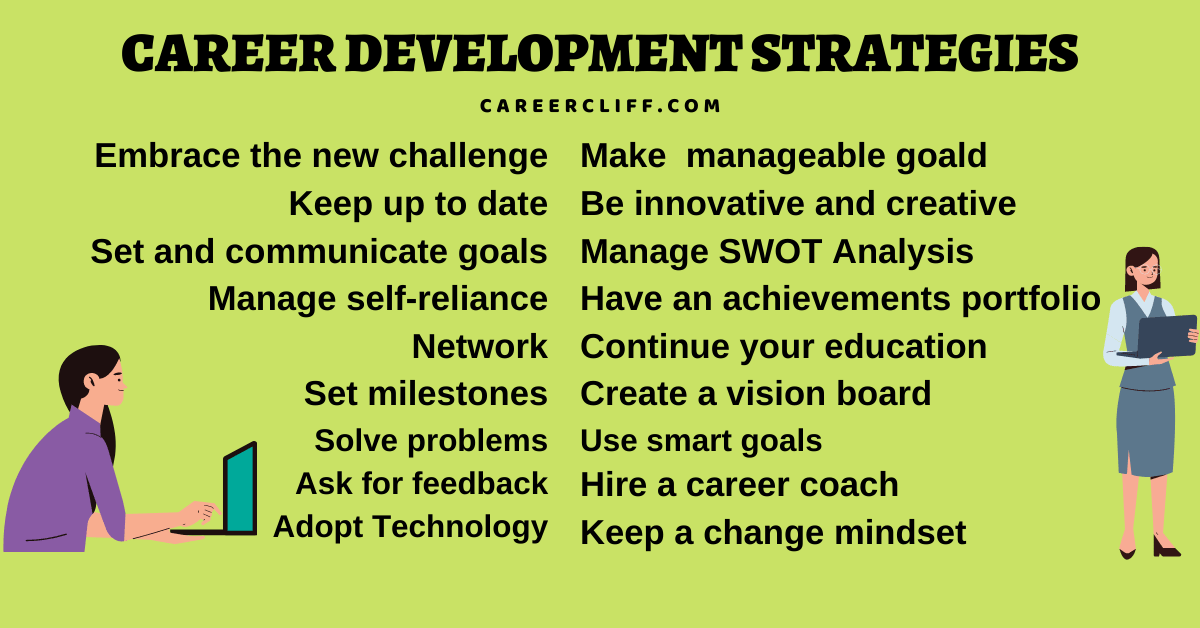Career Growth Strategies are essential for reaching your full potential in the professional world. From skill development to setting SMART goals, this guide will show you how to take your career to the next level.
Importance of Career Growth Strategies
Having effective career growth strategies is crucial for professional development as it helps individuals set clear goals, identify opportunities for advancement, and stay focused on their long-term objectives.
Examples of Successful Utilization
- Networking: Successful individuals often leverage their professional connections to learn about new opportunities and gain valuable insights into their industry.
- Continuous Learning: Taking courses, attending workshops, and staying updated on industry trends are common strategies used by successful professionals to enhance their skills and knowledge.
- Mentorship: Seeking guidance from experienced mentors can provide valuable advice and support, helping individuals navigate their career paths more effectively.
Long-Term Benefits
- Increased Opportunities: By implementing strategic career growth plans, individuals can open up new opportunities for career advancement and professional growth.
- Job Satisfaction: Achieving career milestones and reaching personal goals can lead to increased job satisfaction and overall fulfillment in one’s professional life.
- Higher Earning Potential: Advancing in one’s career through strategic planning can often result in higher salaries, bonuses, and other financial rewards.
Types of Career Growth Strategies

In order to advance in one’s career, it is essential to have a variety of strategies in place to ensure comprehensive growth and development.
Skill Development
- Continuous learning and upskilling in relevant areas.
- Acquiring new skills to stay competitive in the job market.
- Improving existing skills to enhance performance and productivity.
Networking
- Building and maintaining professional relationships.
- Expanding connections within the industry for potential opportunities.
- Seeking mentorship and guidance from experienced professionals.
Further Education
- Pursuing advanced degrees or certifications to increase expertise.
- Gaining specialized knowledge in a specific field or industry.
- Staying updated on current trends and advancements in the field.
Mentorship
- Seeking guidance and advice from seasoned professionals.
- Learning from the experiences and insights of mentors.
- Receiving support and encouragement in career growth and decision-making.
Importance of Diversifying Strategies, Career Growth Strategies
- Diversifying strategies helps in mitigating risks and exploring various avenues for growth.
- Each strategy complements the others, leading to a more well-rounded career development approach.
- Having a mix of strategies ensures adaptability and resilience in the face of changing circumstances or challenges.
Setting SMART Goals for Career Growth: Career Growth Strategies
Setting SMART goals is crucial for career growth as it provides a clear roadmap to success. SMART goals are Specific, Measurable, Achievable, Relevant, and Time-bound.
Defining SMART Goals
- Specific: Goals should be clear and well-defined. Instead of saying “I want to advance in my career”, a specific goal would be “I want to become a manager within the next two years”.
- Measurable: Goals should have tangible criteria for measuring progress. For example, “I want to increase my sales by 20% in the next quarter”.
- Achievable: Goals should be realistic and attainable. Setting impossible goals can lead to frustration and demotivation.
- Relevant: Goals should align with your overall career objectives and aspirations. They should be meaningful and contribute to your growth.
- Time-bound: Goals should have a deadline for completion. This creates a sense of urgency and helps you stay focused.
Tips for Setting SMART Goals
Ensure your goals are aligned with your long-term career vision.
Break down larger goals into smaller, manageable tasks.
Regularly review and adjust your goals based on progress and changing circumstances.
Examples of Successful Professionals
- Elon Musk: Set a SMART goal to revolutionize the automotive industry with Tesla’s electric cars.
- Sheryl Sandberg: Set a SMART goal to become the COO of Facebook and drive the company’s growth.
- Tim Cook: Set a SMART goal to succeed Steve Jobs as the CEO of Apple and lead the company to new heights.
Overcoming Challenges in Career Growth

When it comes to implementing career growth strategies, individuals often face various obstacles that can hinder their progress. Whether it’s a lack of resources, time constraints, or fear of failure, these challenges can make it difficult to achieve significant career growth. However, with the right strategies and mindset, these obstacles can be overcome, leading to success in one’s career journey.
Lack of Resources
- Identify alternative resources: Look for free or low-cost resources such as online courses, webinars, or networking events to continue learning and growing.
- Utilize your existing network: Reach out to mentors, colleagues, or industry contacts who may be able to provide guidance or support in your career development.
- Develop new skills: Take advantage of opportunities to enhance your skills through self-study, volunteering, or on-the-job training to compensate for limited resources.
Time Constraints
- Prioritize tasks: Organize your daily schedule by focusing on high-priority tasks that align with your career goals to make the most of your limited time.
- Delegate responsibilities: Learn to delegate tasks to others or seek help when needed to free up time for activities that promote career growth.
- Create a routine: Establish a consistent routine that includes dedicated time for professional development, networking, and skill-building to ensure progress despite time constraints.
Fear of Failure
- Embrace failure as a learning opportunity: Shift your mindset to view failures as stepping stones to success, allowing you to learn, grow, and improve in your career journey.
- Set realistic expectations: Break down your career goals into manageable steps to reduce the fear of failure and increase confidence in your abilities to overcome obstacles.
- Seek support: Surround yourself with a supportive network of friends, family, or mentors who can provide encouragement and guidance during challenging times.
Success Stories
- Michelle Obama: Overcame obstacles of self-doubt and societal expectations to become a successful lawyer, advocate, and First Lady of the United States.
- Elon Musk: Faced numerous setbacks in his entrepreneurial journey but persevered to become a leading innovator in the tech and space industries with companies like Tesla and SpaceX.
- Oprah Winfrey: Defied the odds of poverty and discrimination to become a media mogul, philanthropist, and inspirational figure known for her resilience and success in the entertainment industry.
